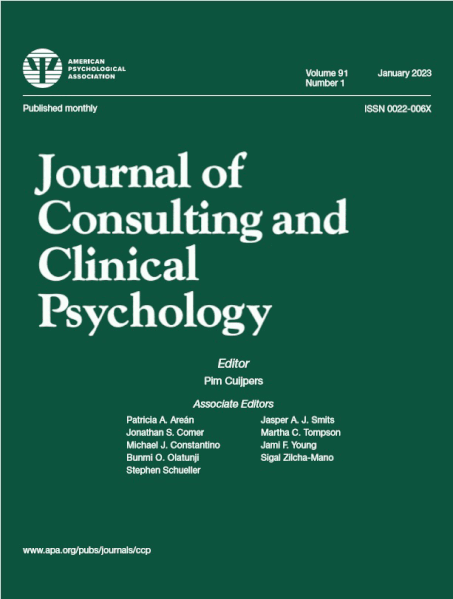Building toward a text-based intervention for parents of suicidal adolescents seeking emergency department care: A pilot randomized controlled trial.
IF 5
1区 心理学
Q1 PSYCHOLOGY, CLINICAL
引用次数: 0
Abstract
OBJECTIVE The growing demand for emergency department (ED) care for suicidal ideation and attempts in adolescents calls for effective interventions preventing post-ED recurrence of suicidal crises. Parents are tasked with implementing postdischarge suicide prevention recommendations, often with little support. To address this need, this study examined a parent-facing texting intervention targeting parental engagement in suicide prevention activities to lower youth suicide risk after discharge. METHOD A pilot randomized controlled trial was conducted with 120 parents (83.3% mothers) and their adolescents (ages 13-17, 65.8% female, 75.0% White) presenting to an ED with suicide risk concerns. Parents were randomized to a control group or a 6-week intervention providing parents with daily adolescent-centered text messages encouraging post-ED parental engagement in recommended suicide prevention activities with or without added parent-centered texts intended to support parents' own well-being. Proposed mechanisms (parental self-efficacy, engagement in suicide prevention activities) were assessed at 2, 6, and 12 weeks. This trial is registered with https://clinicaltrials.gov (NCT05058664). RESULTS The text-based intervention was feasible and acceptable. In exploratory analyses, relative to control, the text-based intervention was associated with greater parental engagement in suicide prevention activities postintervention at 6 (d = 0.48, p = .027) and 12 weeks (d = 0.53, p = .019) and lower youth suicide attempts at 12 weeks (hazard ratio = 0.23, CI [0.06, 0.96], p = .044), regardless of whether parents received additional parent-centered texts. CONCLUSIONS Warranting further study in a fully powered trial, findings suggest this parent-facing texting intervention intended to promote youth safety was acceptable and may offer a promising strategy to lower post-ED youth suicide risk. (PsycInfo Database Record (c) 2025 APA, all rights reserved).为寻求急诊科护理的自杀青少年的父母建立基于文本的干预:一项随机对照试验。
目的对青少年自杀意念和企图的急诊护理需求日益增长,需要有效的干预措施来预防ED后自杀危机的复发。父母的任务是执行出院后预防自杀的建议,通常很少得到支持。为了解决这一需求,本研究考察了面向父母的短信干预,目标是父母参与自杀预防活动,以降低青少年出院后的自杀风险。方法:对120名有自杀风险的父母(83.3%为母亲)及其青少年(13-17岁,65.8%为女性,75.0%为白人)进行了一项随机对照试验。父母被随机分配到控制组或为期6周的干预组,每天向父母提供以青少年为中心的短信,鼓励他们参与推荐的自杀预防活动,并添加或不添加以父母为中心的短信,以支持父母自己的幸福。建议的机制(父母自我效能,参与自杀预防活动)在第2周,第6周和第12周进行评估。该试验已在https://clinicaltrials.gov注册(NCT05058664)。结果基于文本的干预是可行和可接受的。在探索性分析中,与对照组相比,基于文本的干预与干预后6周(d = 0.48, p = 0.027)和12周(d = 0.53, p = 0.019)父母更积极地参与自杀预防活动有关,并且与父母是否收到额外的以父母为中心的文本无关,12周时青少年自杀企图率更低(风险比= 0.23,CI [0.06, 0.96], p = 0.044)。结论:在一项全面的试验中,研究结果表明,这种面向父母的短信干预旨在促进青少年安全是可以接受的,并且可能为降低ed后青少年自杀风险提供了一种有希望的策略。(PsycInfo Database Record (c) 2025 APA,版权所有)。
本文章由计算机程序翻译,如有差异,请以英文原文为准。
求助全文
约1分钟内获得全文
求助全文
来源期刊

Journal of consulting and clinical psychology
PSYCHOLOGY, CLINICAL-
CiteScore
9.00
自引率
3.40%
发文量
94
期刊介绍:
The Journal of Consulting and Clinical Psychology® (JCCP) publishes original contributions on the following topics: the development, validity, and use of techniques of diagnosis and treatment of disordered behaviorstudies of a variety of populations that have clinical interest, including but not limited to medical patients, ethnic minorities, persons with serious mental illness, and community samplesstudies that have a cross-cultural or demographic focus and are of interest for treating behavior disordersstudies of personality and of its assessment and development where these have a clear bearing on problems of clinical dysfunction and treatmentstudies of gender, ethnicity, or sexual orientation that have a clear bearing on diagnosis, assessment, and treatmentstudies of psychosocial aspects of health behaviors. Studies that focus on populations that fall anywhere within the lifespan are considered. JCCP welcomes submissions on treatment and prevention in all areas of clinical and clinical–health psychology and especially on topics that appeal to a broad clinical–scientist and practitioner audience. JCCP encourages the submission of theory–based interventions, studies that investigate mechanisms of change, and studies of the effectiveness of treatments in real-world settings. JCCP recommends that authors of clinical trials pre-register their studies with an appropriate clinical trial registry (e.g., ClinicalTrials.gov, ClinicalTrialsRegister.eu) though both registered and unregistered trials will continue to be considered at this time.
 求助内容:
求助内容: 应助结果提醒方式:
应助结果提醒方式:


